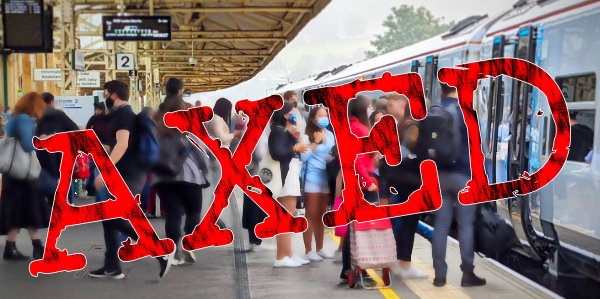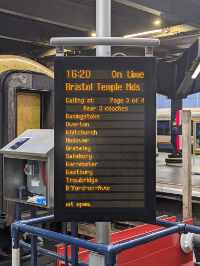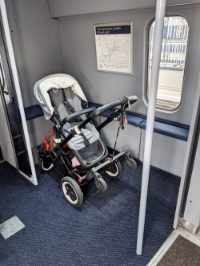Bath Spa - Waterloo direct trains
Bristol - Waterloo Trains: their value
Why these trains matter to the people that use them
- They serve a different set of destinations.
- By doing so, these trains attract customers to rail from other modes of travel - and also enable people to travel who would otherwise not travel at all.
- The fact that the service is well-used - despite being infrequent and considerably slower end-to-end - is overwhelming evidence that the Bristol to Waterloo trains do not duplicate the frequent GWR service to Paddington.
-
- Waterloo is a distinct destination to Paddington.
- Waterloo is a largely accessible transport hub for London and the South East.
- Waterloo has strengths for onward travel to various destinations, and is convenient for leisure and cultural attractions.
- The trains provide the only London through services from Keynsham, Oldfield Park, Bradford on Avon, and Trowbridge (Wiltshire's county town).
Cease this service, and the majority of its users will not transfer to the route via Paddington. Some may abandon rail as a travel mode for their journey. - These are popular services.
 They're well used, the Secretary of State for Transport has said as much in writing - and there are anecdotal accounts that even in 2021 their passenger numbers have recovered strongly - and on occasion they've run full and standing over the entire length of their journey. They serve a leisure market, the segment of the travel market that is showing strong recovery. This is reflected in the ridership of these trains. Do have a look at the photo. This is not an appropriate time to cut the services that support that recovery.
They're well used, the Secretary of State for Transport has said as much in writing - and there are anecdotal accounts that even in 2021 their passenger numbers have recovered strongly - and on occasion they've run full and standing over the entire length of their journey. They serve a leisure market, the segment of the travel market that is showing strong recovery. This is reflected in the ridership of these trains. Do have a look at the photo. This is not an appropriate time to cut the services that support that recovery.- Affordability.
- They offer a more affordable alternative to the Paddington route. Via Salisbury, travel is often 25% to 45% less expensive. This is something that may be driving the decision - to degrade the experience sufficiently to increase the fare take on the route via Paddington. In the process, some passengers will be priced out of rail travel altogether.
- The Timetable
 The lead time on this decision does not allow appropriate alterations to the timetable to accommodate travel needs that the railway has hitherto met by provision of through services. There's no provision for connecting services at Salisbury: onward connections generally involve a 52 minute wait on a route that's prone to poor timekeeping. The GWR Portsmouth to Cardiff trains are subject to overcrowding. Raising the issue of the quality of connections with the Secretary of State for Transport, he has responded that connections will be provided by the half hourly service on the Portsmouth to Bristol line. There never has been a half hourly service on the Salisbury to Bristol line and there are no resources to provide one from December 2021. In any case that line would be unlikely to see half hourly services at the typical times of peak use of the through trains, particularly in the down direction.
The lead time on this decision does not allow appropriate alterations to the timetable to accommodate travel needs that the railway has hitherto met by provision of through services. There's no provision for connecting services at Salisbury: onward connections generally involve a 52 minute wait on a route that's prone to poor timekeeping. The GWR Portsmouth to Cardiff trains are subject to overcrowding. Raising the issue of the quality of connections with the Secretary of State for Transport, he has responded that connections will be provided by the half hourly service on the Portsmouth to Bristol line. There never has been a half hourly service on the Salisbury to Bristol line and there are no resources to provide one from December 2021. In any case that line would be unlikely to see half hourly services at the typical times of peak use of the through trains, particularly in the down direction.- User-friendly and inclusive
 Through services enable travel by young travellers, elderly travellers, people with a disability. Given Waterloo's strength as a transport hub, these through trains to Waterloo are especially valued and particularly benefit disabled travellers. Had an equality impact assessement been carried out, this aspect of their value would have been picked up.
Through services enable travel by young travellers, elderly travellers, people with a disability. Given Waterloo's strength as a transport hub, these through trains to Waterloo are especially valued and particularly benefit disabled travellers. Had an equality impact assessement been carried out, this aspect of their value would have been picked up.- Reliability
- GWR services are impacted by a train provision issue that will continue in the medium term, as faults in the Hitachi fleet are addressed. This is affecting availability across their entire fleet, as regional trains deputise for various flows served by class 80x IEPs. This issue is at a stage that even a decision on a timescale and method to restore that fleet availability will only be made in September of this year. The issue impacts both the Salisbury to Bristol provision and on mainline services from Paddington. This makes it a particularly bad time to decide to cease services to and from London Waterloo. Also, GWR Sunday services between Paddington and Bristol, particularly in the evenings, are from experience often full and standing - the Waterloo service offers an alternative that is not usually at capacity from a train operating company for which a shortage of rolling stock is not such an issue at the current time.
- Covid risk. They allow travellers to manage their exposure
- The ongoing pandemic means that many people are unwilling to travel on the Underground - through services to and from Waterloo means that they can use the service to manage their covid risk. There are major multi-year works in progress to the entrances to the Underground at Paddington - again making this a particularly bad time to discontinue a service that allows people to travel on an alternative route.
- Crossrail not yet open
- Crossrail's provision of public services from Paddington through Central London begins on a date to be announced in 2022. This will improve links to certain parts of South London. Again, before this service is bedded down, it is not the time to discontinue through trains that currently serve the demand for travel to and from South London.
- Need for sound decisions, following appropriate channels
- This change amounts to the withdrawal of an entire train service by stealth. From early 2020, the impact of the pandemic led to an understandable temporary withdrawal of the morning through train to Waterloo. In summer 2021 engineering works at Bristol led to the route being truncated at Bath Spa, the evening train having an hour's wait imposed on it at Salisbury. There was then a period of block cancellations owing to staff availability issues. It is very poor of the railway to then make a decision to cease running what was a valued and well used service. The alternative course - to plan for the service for December 2022 is better both for the travelling public and for the railway.
The primary issue: an entire train service is being axed by stealth, with several trains already removed from the timetable. The DfT and South Western Railways have together sidestepped consultation on the scrapping of a well used train service. This may be unprecedented.
It's suggested that this is to be done on grounds of cost. Withdrawing the direct Waterloo-Bristol trains will not materially address South Western Railway's deficit: it will reduce passenger numbers.
To reduce the deficit and provide value for money to the taxpayer: SWR needs to grow passenger numbers.
It's suggested that these trains can be replaced by connections. There are as yet no provision for connections to replace the through trains, so passengers will usually be faced with 50 minute to an hour's wait before boarding a connecting service - which may already be full. This is particularly an issue for wheelchair users.
With no through trains, passengers will experience poor connections at Salisbury from December '21 until at least winter 2022.
Also, they'll find half of the off-peak trains east from Salisbury running to Basingstoke and Reading rather than London Waterloo. Travellers for Waterloo from Bristol may need to change twice.
Mark Annand. Site updated 12th December 2021 •
Two Tunnels: Made in Bath.